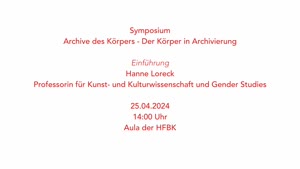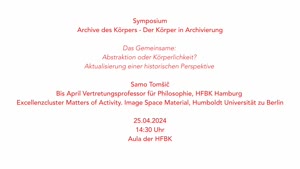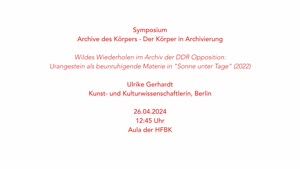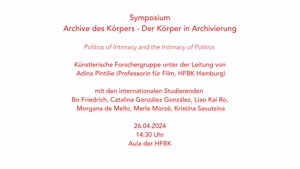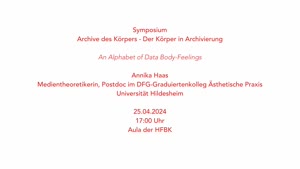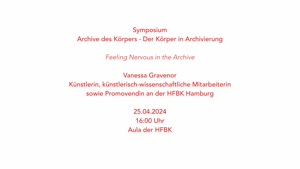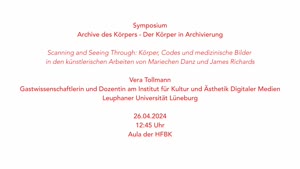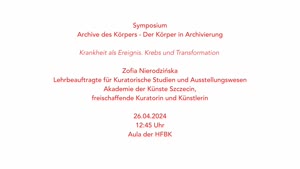Bodies, Bound and Unbound: Some Notes on War and Psychic Fragmentation in Wilfred R. Bion’s Papers on Psychosis - Takeo Marquardt - Takeo Marquardt - HFBK
- MEDIATHEK
- All videos
- HFBK
- Alle Bereiche
- Archives of the Body - The Body in Archiving
All videos
Bodies, Bound and Unbound: Some Notes on War and Psychic Fragmentation in Wilfred R. Bion’s Papers on Psychosis - Takeo Marquardt
This talk seeks to engage with British psychoanalyst Wilfred R. Bion’s work via his experiences as an officer in the First World War, linking his traumatic war experiences of the extreme vulnerability of the human body to his pioneering work in understanding psychosis and the psychotic parts of the mind. It aims to draw out how Bion’s autobiographical descriptions of chaos and fragmentation on the battlefield resonate with his clinical explorations into the mind’s potential to fragment or dis-integrate under internal and external pressure. Bion’s writing on psychosis and his autobiography share a highly dynamic aesthetic which captures a constant movement between relative form and formlessness. As he sought to reduce psychoanalytic theories to their most fundamental and abstract elements, Bion transformed Freud’s concept of the Oedipus complex in his own model, whereby psychic experience is bearable only if there is a capacity to tolerate internal objects becoming “linked.” This essay aims to show how Bion’s theory of intrapsychic “attacks on linking” may also provide a framework to understand the fragility of psychosomatic self-perception.
Takeo Marquardt is a Child and Adolescent Psychoanalytic Psychotherapist for children and adolescents in doctoral training at the Tavistock Centre in London, working in a busy clinic in the public sector. He previously studied Fine Arts and Art Theory at the Academy of Fine Arts, Vienna, and the University of Fine Arts Hamburg, where he graduated with an essay on the aesthetics of anxiety in the work of British-Austrian psychoanalyst Melanie Klein. He also holds an MA in Psychoanalytic Studies from the Tavistock Centre, having submitted a thesis on fascist states of mind and the psychosomatic. Takeo has worked with artists such as Alison Yip and Anna Fehr on projects exploring the intersection of psychology and art and has lectured at conferences such as Hazy Borders of the Heart at the Hochschule für Grafik und Buchkunst Leipzig.
---
Im Blick auf den menschlichen Körper ist die Ordnungsform ‚Archiv‘ als das techno-mediale Arsenal zu verstehen, das Körper und Subjekte historisch geformt hat und weiterhin Identitäten, Handlungsweisen, Machtverhältnisse und Gemeinschaften gestaltet. Das ‚Archiv‘ funktioniert als epistemologisches Regime. Es besteht aus Repräsentationssystemen, Diskursen, Institutionen, Konventionen, Praktiken und kulturellen Vereinbarungen. Es bestimmt, welche Körper, Geschlechter und Sexualitäten sichtbar werden und welche nicht, welche kulturell, sozial und ökonomisch zählen und welche als nutzlos gelten. Denn Körper sind nicht einfach gegeben, sondern werden durch Prozesse der Beschreibung, Abformung, Modellierung, Nach- und Abbildung hervorgebracht. In den fünf Kapiteln Körper im Kontext, Medizinische Körper, Datenkörper, Narrative vom Psychischen und Verletzliche Körper werden historische Archivbezüge aktualisiert und die gesellschaftlichen und kulturellen Subjektivierungsweisen durch solche Datensammlungen, ihre Auswirkungen auf das Persönliche und das Politische theoretisch und ästhetisch untersucht: Kritische Analyse trifft auf Formen des Widerständigen.
Mit einem Symposium, einer Ausstellung, einem Filmprogramm mit Recherchematerial zum begehrenden und sexuellen Körper sowie einer umfassenden digitalen Publikation in Zusammenarbeit mit der Klasse Digitale Grafik der HFBK Hamburg.

